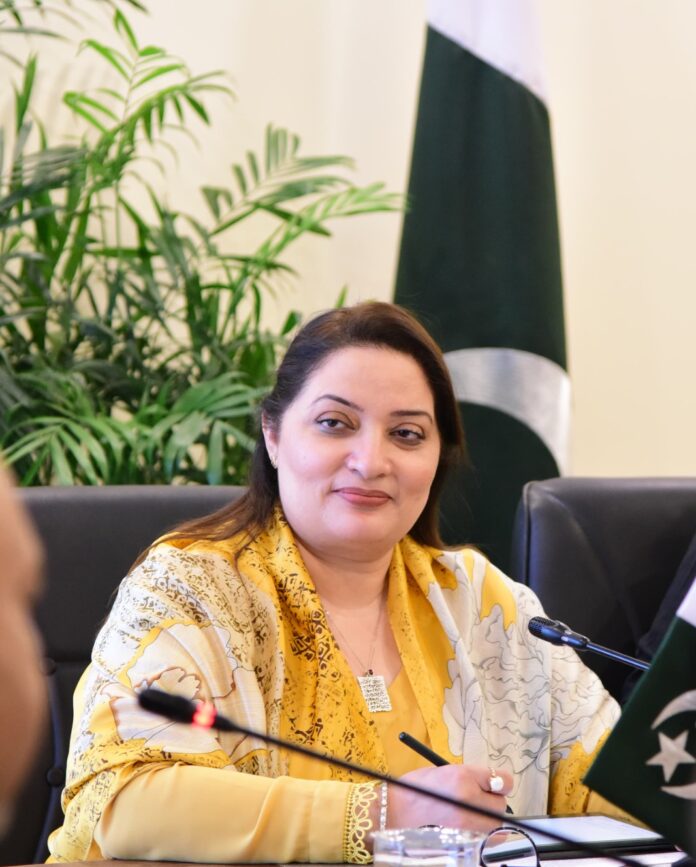- Advertisement -
ISLAMABAD, Feb 19 (APP):Coordinator to the Prime Minister on Climate Change, Romina Khurshid Alam has called for the development of inclusive climate strategies that prioritize the involvement of women, girls, transgender individuals, and Persons with Disabilities (PWDs) in climate change mitigation efforts for environmental sustainability.
Romina addressed participants here on Wednesday at a consultation workshop on “Advancing Gender-Responsive, Inclusive, and Climate-Resilient Nationally Determined Contributions (NDCs),” where she highlighted Pakistan’s significant climate vulnerability and its disproportionate impact on women and marginalized communities.
The event was organized by WaterAid Pakistan, a programme for sustainable water, sanitation, and hygiene, and Potohar Organization for Development Advocacy (PODA), a network advocating for the rights of rural women.
She explained that although Pakistan contributes less than 1% of global carbon emissions, it faces some of the most severe consequences of the climate crisis. The 2022 floods, which caused damage exceeding 24 billion PKR, serve as a stark reminder of the devastating impacts of extreme weather events on infrastructure, livelihoods, and vulnerable communities, particularly women, girls, transgender individuals, and PWDs.
“Women, especially in rural areas, are disproportionately burdened with water collection, sanitation management, and caregiving responsibilities,” Romina stated. “Climate-induced disasters such as floods and droughts further exacerbate water insecurity, and food insecurity, and contribute to gender-based violence and early marriages. Unfortunately, women are often excluded from climate decision-making, which diminishes the effectiveness of policies and leaves them even more vulnerable.”
Romina also reflected on Pakistan’s progress at COP29, where the country unveiled its climate finance framework, marking a crucial step in mobilizing investments for climate action. As part of its NDCs, Pakistan has committed to reducing carbon emissions by 30% and ensuring that 60% of its energy mix comes from renewable sources by 2030. “These commitments demonstrate Pakistan’s dedication to tackling climate change,” Romina stated.
“However, to effectively address this crisis, it is essential that gender equality and the inclusion of marginalized groups are at the center of our policies. The Climate Change Gender Action Plan, launched by the government of Pakistan, is a significant step towards integrating gender-responsive strategies into our climate action plans.”
She continued, “This plan addresses the specific vulnerabilities of women and marginalized groups while ensuring their active participation in policy development and implementation. As we continue to update our NDCs, it is critical that we incorporate these principles into every aspect of our climate strategy.”
Romina emphasized that integrating gender equality into climate action aligns with Pakistan’s national goals and global commitments. She highlighted the need to include women and marginalized communities in water governance and decision-making to achieve SDG 6 on clean water and sanitation.
“Despite our progress, there are still policy gaps that need to be addressed in our approach to gender-responsive climate action,” she said. “Women and marginalized groups continue to face barriers to participation in climate governance, and excluding them from decision-making weakens the impact of our policies. This perpetuates existing inequalities and makes it harder to build truly inclusive and resilient communities.”
Romina stressed the need for revising existing policies to promote inclusivity, ensuring that the unique needs of women and vulnerable groups are reflected in climate frameworks. This, she noted, requires a stronger integration of gender-responsive measures and the creation of inclusive spaces for marginalized voices, particularly those of women.
“As we move forward with revising our NDCs and enhancing our WASH frameworks, it is essential that we place gender equality and social inclusion at the heart of these efforts. By embedding these principles into our climate policies, we will not only tackle climate change more effectively but also create a more equitable and resilient future for all Pakistanis,” she concluded.

